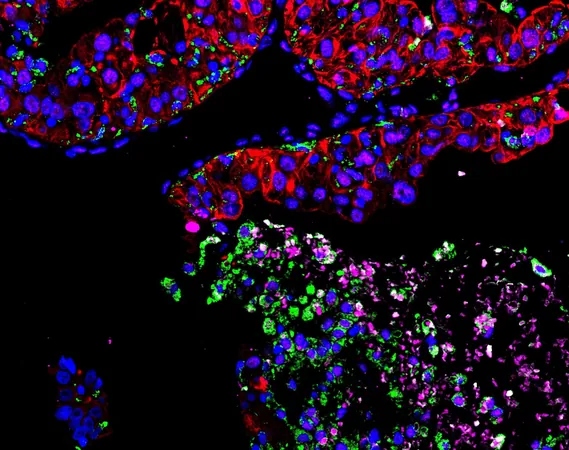
Cancer's Sneaky Strategy: How Tumors Cause Anemia Through Iron Theft
2025-09-03
Author: John Tan
Cancer's dark side just got a little darker! A groundbreaking study from Princeton University reveals how metastatic breast cancer cells hijack the body’s iron supply, leading to anemia—a common and dangerous condition when cancer spreads to bone.
In a pivotal study featured in the journal Cell, researchers Yibin Kang and Yujiao Han explain how cancer cells effectively commandeer specialized macrophages, known as erythroblast island (EBI) macrophages. These cells are supposed to recycle iron for healthy red blood cell production, but the tumors divert this iron, depriving blood cells and allowing cancer to flourish.
The study shines a light on the grim reality of metastatic cancer, which is responsible for the majority of deaths in breast and prostate cancer patients. A staggering 70% of these cases involve bone metastasis—making this research not just relevant but absolutely critical for understanding and eventually treating this deadly condition.
Decoding Cancer’s Survival Tactics
Kang emphasizes that this discovery marks a significant shift in understanding how cancer spreads. Historically, researchers have focused on the cancer cells themselves—the 'seeds'—and not the environment—the 'soil'—that nurtures their growth. Kang likens this new approach to a classic hypothesis proposed by British surgeon Stephen Paget over a century ago.
Until now, the 'soil' of the bone marrow has remained largely uncharted territory in cancer research. However, with cutting-edge technologies like single-cell sequencing, Kang's team has finally mapped the bone marrow’s intricate landscape.
Cancer Cells: Masters of Deception
In a twist of fate, under normal circumstances, EBI macrophages play a nurturing role, providing iron necessary for the development of red blood cells. But in the presence of a bone metastasis, these macrophages are lured by tumors through clever signaling. The cancer cells not only disrupt iron supply but also hinder the final maturation of red blood cells, worsening anemia and leaving patients vulnerable.
As if that wasn't enough, cancer cells are also billion-dollar budget psychopaths—using the stolen iron to mimic red blood cells. Guided by a specific blood-cell transcription factor known as GATA1, tumors produce hemoglobin, enhancing their survival in the bone's oxygen-poor environment.
Creating a Vicious Cycle
This dastardly strategy allows the tumor to thrive while simultaneously crippling the body’s ability to produce new red blood cells. In essence, the cancer creates a vicious cycle: it consumes the bone’s resources for itself while sabotaging the very mechanisms that keep the host alive.
"It’s like a wolf disguising itself as a sheep, feeding off similar resources to survive better in its environment," Kang notes. This revelation could hold the key to slowing down or even treating bone metastasis and alleviating anemia-related complications, offering hope for patients battling this insidious disease.



 Brasil (PT)
Brasil (PT)
 Canada (EN)
Canada (EN)
 Chile (ES)
Chile (ES)
 Česko (CS)
Česko (CS)
 대한민국 (KO)
대한민국 (KO)
 España (ES)
España (ES)
 France (FR)
France (FR)
 Hong Kong (EN)
Hong Kong (EN)
 Italia (IT)
Italia (IT)
 日本 (JA)
日本 (JA)
 Magyarország (HU)
Magyarország (HU)
 Norge (NO)
Norge (NO)
 Polska (PL)
Polska (PL)
 Schweiz (DE)
Schweiz (DE)
 Singapore (EN)
Singapore (EN)
 Sverige (SV)
Sverige (SV)
 Suomi (FI)
Suomi (FI)
 Türkiye (TR)
Türkiye (TR)
 الإمارات العربية المتحدة (AR)
الإمارات العربية المتحدة (AR)